Local Project: Mead PL – Social Services in the Library
Mead Public Library – Sheboygan, Wisconsin
Author: Melissa Prentice, Public Services Manager
Final Cost: $1,500
Table of Contents
Library and Community Information
Library Profile (2019)
- Service population: 48,697
- Staff FTE: 38
- Total library income: $3,632,648
- Total visits: 326,128
- Total cardholders: 43,779
- Total circulation: 528,396
Community Profile (2020)
- Population: 48,153
- Median age: 36.8
- Median household income: $52,088
- Poverty rate: 10.5%
The Takeaways
- Staff have a better understanding of how social work and library professions overlap and how they are different. In particular, they have a much improved understanding that connecting people with resources is very much “our”work, while being an expert in mental health, trauma, civil legal matters, navigating social services, and/or addiction is not.
- We learned that our staff are burned out and take home a lot of vicarious trauma from their interactions with patrons in crisis and feel they are not able to provide adequate answers/support much of the time.
- We learned that this is a whole community problem and we need to team up with other organizations in our city and involve our trustees, leaders, and stakeholders in advocating for community-wide solutions.
The Project
Tell us a little about your library and where you are in resilience readiness, including applying aspects of social work in your operations. Are you a beginner, have some experience, or far along?
We have some experience, having hired a community resources/public safety specialist 3 years ago and providing some training to our staff on these issues (Ryan Dowd).
Describe your project! What did you do? Who was involved? What did it cost, in terms of both purchases and staff time?
- Purchased copies of the Whole Person Librarianship (WPL) book for all public services staff and library Trustees; approximate cost $1500.
- Provided Sara Zettervall’s training to all public services staff and library Trustees; two three hour sessions.
- Started working on the “Social Service Office Hours” project to bring various service providers into the library at designated times to meet with patrons and share information. Cost has primarily been staff time at this point and the project is in very early stages.
How did you decide to pursue this project? What needs did it address in your library and community? How did you discover these needs?
The “Social Service Office Hours” concept is something we’d been mulling for a while. We quickly realized that its scope and the nature of wrangling many different people and organizations would be too much to accomplish within the confines of the granting period and associated deadlines; however, the WPL book, training, and collaboration with CLC libraries very much informed the direction we took and that project remains on-going. Our official project for the grant was engaging with the WPL book and training, as well as getting our trustees involved with both.
What is the intended impact of your project, and how did/will you measure it?
Our intention with providing the WPL and training to staff and trustees was to 1) help all parties gain a better understanding of how social work and librarianship complement each other and how they are different; 2) help stakeholders understand the impact of these issues and interactions on our staff and community; and 3) mobilize our trustees and stakeholders to advocate for the changes in funding and services needed in our community broadly.
In reviewing the survey results from our library as well as having follow- up conversations with staff and trustees, I would consider this a success. Our trustees have added updates/conversations about these issues to monthly board agendas and our staff have a better understanding of both the ways they can intervene and the ways they cannot when assisting patrons with these issues.
What challenges, seen and unforeseen, did you encounter? What strategies did you use to overcome these?
The main challenge was the limited timeframe to complete projects within the purview of the grant. We overcame this by shifting our official project to something manageable within those parameters.
Looking back, what might you do differently if you were to redo this project?
I might reconsider the staff training piece. The WPL book is a great resource, but our staff were not as satisfied with the training. They responded much better to Ryan Dowd’s trainings and I think training on Trauma Informed Concepts would be much more beneficial.
What do you want other librarians to know about your project?
This work is very much scalable to any sized library or community and does not require a large staff or large budget to have a positive impact.
How have you incorporated concepts of community resilience into your library’s work? Have you found trainings like Ryan Dowd’s Homeless Training, Sara Zettervall’s Whole Person Librarianship, or others valuable? What have you found to be the most useful and how have you applied it in your specific community?
As part of developing the “Social Service Office Hours” project, we have brought several organizations in to do “lunch and learns” with our staff. This has the benefit of providing our staff with information on the various services offered in our community, while also informing those outside organizations of what we’re seeing in the library. This information sharing and opportunity for reflection contributes to community resilience by giving all of us a better understanding of the needs and services available as well as the gaps. Getting our trustees involved has resulted in interest from the Mayor in advocating for more funding and better services for our community.
